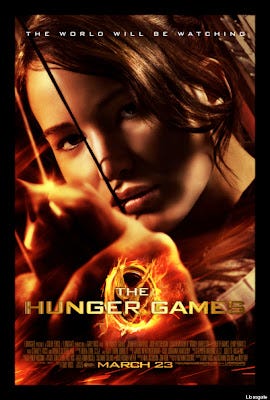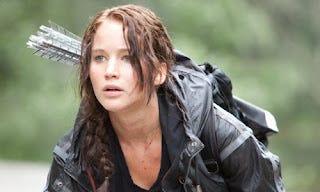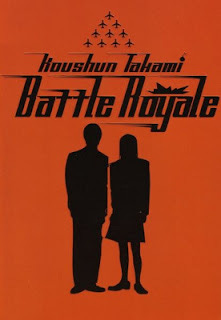“The Hunger Games” Versus “Battle Royale” – A Critical Analysis of Two Similar Works: Act Two – Why “Hunger Games” is the Dumb American Version of “Battle Royale”

This Friday, the first big tent-pole release of 2012 hits theatres: “The Hunger Games,” an adaptation of Suzanne Collins’ 2008 smash-hit novel. I’m excited for the movie, as are many others, but here’s the thing….when I read the book, it felt awfully familiar. In fact, it was remarkably similar to one of my favorite books of all time, Koushun Takami’s “Battle Royale,” published in 1999. So throughout this week, I’m publishing a special three-part article investigating whether or not Collins stole from Takami, and why that informs how we should look at “The Hunger Games.”
Today, we’re focusing on what I consider to be an important cultural question: if “Battle Royale” and “Hunger Games” are indeed so similar, then why is one so wildly controversial and the other widely accepted? My answer: “The Hunger Games” is the Dumb American Version of “Battle Royale.” Before you stone me, let me explain myself in Act Two of the article; Act One went up yesterday, and Act Three will post tomorrow, followed by my review of the “Hunger Games” film on Friday.
So without further ado, enjoy Act Two of “The Hunger Games” Vs. “Battle Royale” after the jump…
Jonathan Lack at the Movies Presents
“The Hunger Games”
Versus
“Battle Royale”
A Critical Analysis of Two Similar Works

Act Two:
What Do You Think a Grown-Up Should Say to a Kid Now?
Why “The Hunger Games” is the dumb American version of “Battle Royale”
I find it disturbing that “The Hunger Games” film adaptation is coming to theatres without any notable controversy.

It is a story about kids slaughtering kids. There’s no getting around that. As a child of the nineties, adolescent violence has been one of the most provocative social issues in my living memory. I was six when the Columbine massacre happened; it took place thirty minutes from my home, and just like airport security post-9/11, I can’t remember a media landscape uninfluenced by the shootings. Violence between children carries incredible weight in today’s world; depicting it in a movie, TV show, or book is a major decision, and no matter what the artistic justification, there’s almost always controversy. Just look at the impact Columbine had on video games; every argument about banning games eventually finds its way back to the massacre.
To most, the subject of kids-killing-kids is simply off limits, and that’s only been reinforced by subsequent high-profile school shootings. “Battle Royale” is an example of one story withheld from the American public because of this status quo. The book was eventually translated to English in 2003 by Viz Media, but the film adaptation from 2000 was never licensed for American distribution until 2012. It’s easy to see why. The film came on the heels of Columbine, and no American studio wanted to touch that property with a ten-foot pole. Companies felt it would be in bad taste, and while I believe the movie is a hugely important work of art, I wouldn’t blame anyone for leaving it alone. The art itself would have paled in comparison to the controversy, which would drive ticket sales at the expense of public image. In 2006, New Line Cinema actually started developing a remake of “Battle Royale,” but after the Virginia Tech shootings of 2007, they quietly cancelled the project. Again, the inevitable controversy simply wouldn’t be worth the effort.
But “The Hunger Games” – which, as I hope I’ve sufficiently established, is extremely similar to “Battle Royale” – is coming to theatres without a lick of controversy. No protests. No news pieces. No opinion columns declaring it insensitive. The studio never hesitated bringing the story to screen. It’s being treated like any other Hollywood blockbuster.

Yet it is, inescapably, a story about kids killing kids. Brutally. Graphically. And it’s coming to theatres a month after another horrible school shooting, where three teenagers were killed by one of their classmates at Chardon High School in Ohio. No one’s making the connection, and this bothers me.
Not that I’m advocating the media turning everything into a controversy. That irks me to no end. I hate the argument that video games cause real world violence. I hate it when people wish to ban books because they feel the content is harmful for children. And I certainly don’t believe “The Hunger Games” should be a target for protest and vitriol. But when it comes to certain issues, like violence among adolescents, there should at least be discussion. It doesn’t have to be wild, passionate, or frenzied, but this is a very real, very significant topic, and I believe it would be perfectly acceptable for someone – a news outlet, a blogger, a class, etc – to point out that millions of teens are soon going to be watching a film about adolescent slaughter less than a month after a 17-year-old shot five of his classmates. That shouldn’t get “Hunger Games” banned or attacked, but the societal significance of this parallel should be discussed.
But it isn’t, and that’s not surprising given that the book has been around since 2008 without any significant controversy. Some schools apparently tried to ban it, but this was mostly a fringe effort; in my High School, we were encouraged to read it. The library always had it on display as a paragon of good teen literature (which, all things considered, isn’t necessarily inaccurate).
Ever since I read the book, this lack of controversy has baffled me. It’s got all the makings of a challenged novel, and yet I still hear far more rumblings about “Harry Potter,” which is about as clean as young adult fiction can get. And again, the absence of debate becomes especially notable when one recognizes the novel’s similarities to “Battle Royale,” one of the most controversial works of recent times. I finally came to a conclusion as to why “The Hunger Games” has commercially succeeded where “Battle Royale” has not when I stopped looking at how the books are similar and started thinking about how they are different. What is it that makes one controversial and one squeaky clean? I suspect many aren’t going to like my answer, but here it is, as simple as I can put it:
“The Hunger Games” is the dumb American version of “Battle Royale.”
While all the “Hunger Games” fans move to sharpen their pitchforks, please keep in mind that I don’t mean ‘dumb’ as a pejorative: I’m using it in the sense of “dumbed-down,” or “simplified.” “American,” on the other hand, might be a pejorative. You can judge that one for yourself when we reach that part of the discussion, but in its most basic form, I simply mean that “The Hunger Games” caters to specifically American sensibilities and tastes. What I’m trying to get at with this statement is that if Suzanne Collins did indeed rip off “Battle Royale,” which I believe she did, the most significant alterations she made are thematic ones that simplify Koushun Takami’s original work and place “The Hunger Games” in a firmly American context.
Allow me to elaborate.

If you’ve never read “Battle Royale,” here’s something you have to understand: it’s a hard, hard, hard book to read. Impossible for some, I suspect, because it is a book about young people facing their inevitable deaths, and Takami doesn’t pull a single punch. He describes each killing in clear, matter-of-fact, remorseless terminology; he never cushions it, never makes it easier for the reader to handle, no matter how much we may love the character in question. And make no mistake, we get to know these characters very well. With the exception of a few intentionally less-developed personalities, Takami develops most of the novel’s 42 students into living, breathing creations. He is a remarkably adept observer of teenage behavior and interactions. These people feel real, and their deaths resonate with proportional intensity. Because we know these characters so well, we are faced with the full, undiluted horror of death over and over again; each time someone is killed, it is endlessly disturbing experience, and it becomes incredibly difficult to move on to the next page when you know that instead of consolation, you will be faced with another unsettling murder.
The book is so difficult to get through, for me at least, that I’ve only ever read it cover-to-cover once. I’ve tried re-reading it, and though I’ve come quite close, I’ve never had the stomach to get all the way through to the end. The novel is a heart-wrenching exploration of the limits of the human soul, and the reader is part of the study: Takami is directly challenging you to see how much you can take.
This leads to the inevitable question….why read “Battle Royale” at all? The simple answer is that its intensity is profound. It has deep, meaningful things to say about the way teenagers interact and the decisions they might make when faced with their premature demise. You will see yourself somewhere in that book; you will stumble on familiar characters, scenarios, and choices, and as with the best literature, you will gain insight into your own personality during the process. Would you kill to survive? Would you refuse to take another life? Could you be friends with a person you may have to murder? The characters ponder these questions to no end right alongside the reader.
Takami’s broader social implications, meanwhile, speak to the ways adults with power manipulate and destroy youth for their own gain; in fact, by forcing us to feel the toll young people pay when thrust into combat, it may be one of the great anti-war stories. No matter what, “Battle Royale” tackles a subject we’d rather not touch, but that doesn’t prevent the topic from being profound. If the novel were any less intense, if it compromised in any way, it wouldn’t have the impact that makes it a masterpiece.
For all the time I’ve spent comparing “Battle Royale” to “The Hunger Games,” the similarities between the two are all on the surface. Nothing I’ve written about “Battle Royale” in this section applies to Suzanne Collins’ book, for “The Hunger Games” is a novel that features death as its core plot device, not its central thematic concern. It is a survival thriller, plain and simple, one where the implications and horrors of death are explored in only the most cursory of ways. Collins doesn’t examine the toll confronting one’s mortality takes on the soul. The characters don’t change from the experience, except by learning how to survive. The novel’s morality is stark and simplistic: the ‘tributes’ who have trained in combat for the Games are painted as dastardly villains (even though this is the most logical course of action in Panem), and Katniss is the good person ‘forced’ into killing because of their presence. There are no shades of grey; Katniss never contemplates what it means to take another life, nor does she consider ‘rising above’ the challenge she’s been given by refusing to participate. It is a black-and-white, good versus evil, kill or be killed story meant not to create debate but to excite, engage, and entertain the reader. It revels in the thrills of violence without giving a thought to its deeper implications.
In short, it is a distinctly American work.
If you are at all cognizant of domestic media trends, you are surely aware that our nation, on the whole, displays a remarkably casual attitude towards violence. When films, TV shows, and even video games are given official content ratings, sex, bad language, and substance abuse are all prioritized far higher than violence. In politics, violent rhetoric forms the basis for nearly all discourse; just look at how many social issues are now ‘wars’ – “War” on drugs, “War” on poverty, “War” on religion, class “warfare,” “War” on guns (whatever the hell that means), etc. And that’s just a natural extension of how easily we find ourselves in real wars. News outlets rely heavily on violent stories for ratings – “if it bleeds it leads,” as they say. I could go on and on. The sum total of these troubling mainstream morals is a media system that gives little thought to violence. It is used to excite and to thrill, but when it is used to prompt discussion, general audiences recoil.
This is why “Battle Royale” was such a breath of fresh air for me when I read it as a 14-year-old. It made me think about violence in different and deeper ways than my current media diet allowed. It challenged me to seek out other works that were more thoughtful in their depiction of violence, which is when I discovered that there are plenty of American stories, classics and contemporary, that go deeper than the mainstream allows if one knows where to look.
“The Hunger Games,” on the other hand, is what I always expected a mainstream American remake of “Battle Royale” to look like. It contains all the visceral, page-turning thrills of Takami’s novel without any of its depth or complexity. It uses violence as a means to an end, to entertain the reader by putting them on the edge of their seat, one of the foremost strategies for creating an American blockbuster.
So as I said before, “The Hunger Games” is the dumb American version of “Battle Royale.” ‘Dumb’ in the sense that it removes those messy, thought-provoking moral quandaries, and ‘American’ because of the distinctly cultural ways it portrays violence as thrilling and heroic. This is why “The Hunger Games” has been, and will continue to be, a mammoth domestic success where “Battle Royale” could never hope to attain broad American acceptance. Suzanne Collins doesn’t ask us to step outside our comfort zones. She doesn’t ask us to ponder questions we’re not used to pondering. She has made a story like “Battle Royale” perfectly fit for American audiences by simplifying the morality to accentuate the thrills.

And you know what? I can’t say that’s inherently wrong. I like a good action movie as much as the next guy. Hell, recklessly violent American cinema is an essential part of my media diet. “Die Hard” is one of my favorite films. I love a good car chase blockbuster like “Fast Five” to no end. When Iron Man, Captain America, Thor, and the Incredible Hulk team up to protect the Earth and decimate a major metropolitan area in the process, I’ll be there for the midnight screening. Do I personally get more out of a movie that takes a sharp, critical look at violence? Yes, and that’s what the great American directors like Martin Scorsese are there for. But that doesn’t mean I can’t sit back and have fun with an action-packed novel, movie, or video game when I’m in the mood. In its most basic form, that’s what entertainment is all about: having fun. And “The Hunger Games” is one hell of a fun read; for all the comparisons I’ve made between it and “Battle Royale,” Collins is extremely creative and inventive in the ways she keeps the audience engaged. As for the movie, I’m going to be there day one; it looks like it’s going to be an endlessly enjoyable thrill ride.
I didn’t write a word of this article intending to disparage Suzanne Collins or her novel, because if I did, I would be a raging hypocrite. I simply feel that the similarities between “The Hunger Games” and “Battle Royale” present a fascinating case study in cross-cultural attitudes towards death and violence, and all I’ve tried to do with this article is to prompt you into thinking about our culture differently than you may have before. This is a discussion worth having. When any story, be it “The Hunger Games” or “Harry Potter” or “The Dark Knight,” becomes a major mainstream success, we should take the time to examine the root of its appeal. The results may be inspiring, disheartening, or anything in between, but thoughtful analysis is where good media literacy comes from.
When it comes to a property like “The Hunger Games,” which is built around a fairly disturbing premise, that analysis is more crucial than ever. Enjoy the book. Flock to the movie. Revel in the glory of Panem. Have fun. I know I will. But please, think about the deeper implications of the story and its mainstream success. If you disagree with me - which I expect and encourage, as I've only related my personal experience with a novel that means many things to many people - and believe Collins' story does have significant moral, thematic, or ethical values, please share your thoughts in the comments. I want to hear them. But no matter how you or I view "The Hunger Games," or, for that matter, "Battle Royale," these issues are important, and at the very least, they’re worth a discussion.
TO BE CONCLUDED
Read ACT THREE here...
This article is being presented in three parts on www.jonathanlack.com, with part 3 publishing tomorrow (Part 1 was released yesterday). If you would like to read the full, unedited version of the article, please e-mail webmaster@jonathanlack.com and we will send you a PDF version of the complete article.

